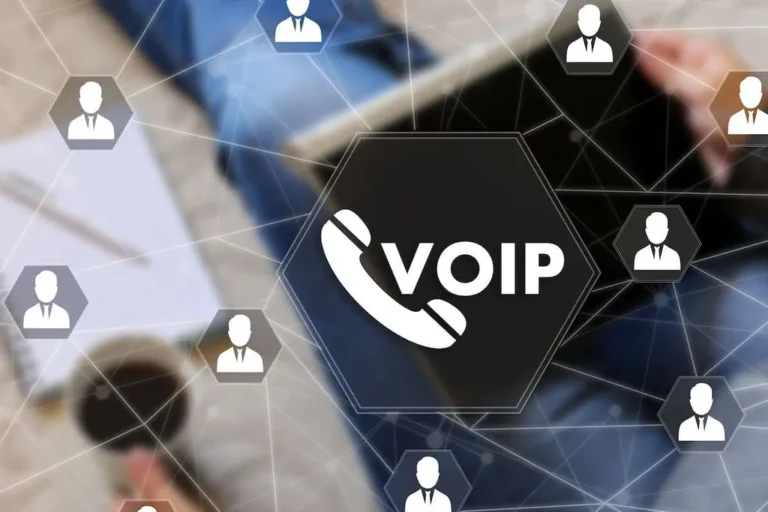What is a VoIP Contact Center: A Complete Overview

Technology development helps businesses provide personalized customer support (CS) and strengthen their relationships with the target audience. Adding the human touch to client interactions increases engagement and satisfaction. Phone calls remain the preferable communication channel among those who want to solve issues without delays. However, maintaining on-premises infrastructure requires substantial investments. The development of the Voice over Internet Protocol (VoIP) helps companies scale up operations and expand outreach. In this guide, we will explore the feasibility of such cost-effective solutions and demonstrate how a VoIP contact center helps ventures to get a cutting edge.
What is a VoIP Call Center?
The term refers to a modernized system based on communication technology that enables enterprises to accept voice calls online instead of relying on landlines. VoIP does not require a dedicated connection, as it automatically converts signals into digitized units. Such solutions are cheaper and more effective than the traditional Public Switched Telephone Network (PSTN), as they enable companies to do the following:
- Route calls;
- Collect and analyze contact center data;
- Provide omnichannel customer service.
VoIP contact center solutions empower firms to make and accept calls via such popular services as Skype, Zoom, or Messenger. They are easy to deploy and use, and they are more convenient than landlines. The functioning of such systems requires the following:
- A reliable connection;
- A computer or smartphone;
- An integrated or external mic.
Enterprises implement such software without significant expenses, that makes them a better option than phone-based systems.

We are confident that we have what it takes to help you get your platform from the idea throughout design and development phases, all the way to successful deployment in a production environment!
How Does a VoIP Contact Center Function?
The system automatically converts signals into chunks of data, saves them as packets, and sends them over the network to a recipient. The usage of the same infrastructure for voice and data allows businesses to save valuable resources. Some companies utilize private IP networks for better security. When the packets reach the set destination, they are rearranged to recreate the initial sequence.
VoIP systems let firms access the following top-grade tools:
- Automatic Call Distribution (ACD): All incoming calls are re-directed to free agents, eliminating queues. Intelligent routing removes bottlenecks.
- Call recording: Storing, processing, and analyzing digital conversations is easier. Companies can monitor interactions and use the collected data to enhance customer experience (CX).
- Interactive Voice Response (IVR): Clients can select suitable menu options using voice commands or a touch-tone keypad.
- Pre-programmed virtual assistants: They greet customers and route them to specialists with relevant experience.
VoIP facilitates building all-in-one communication systems that allow agents to handle voice calls, messages, and video conversations. The deployment of such tools empowers businesses to streamline operations and maintain a professional approach.

Key Advantages of a VoIP Contact Center
Recognizing the benefits of the new technology is the first step toward building a sustainable business and enhancing CX. Switching to VoIP solutions helps enterprises to achieve the following objectives:
- Save money: PSTN-based systems are more expensive to deploy and maintain. Besides, companies spend a lot of resources on international calls. Alternative solutions allow firms to scale up to meet the increasing demand at lower costs. A VoIP call center does not require building a large infrastructure and investing in hardware and its maintenance. Providers offer a variety of affordable pricing models, making them perfect for those who prioritize quality. Companies deploying VoIP pay only for the resources they use.
- Integrate contact center CRM systems: Managing client data and analyzing the key metrics allows businesses to improve the quality of calls and provide personalized service. Higher efficiency facilitates exploiting cross-selling opportunities and reducing the average resolution time. The integration of CRM software allows agents to store information about calls, chats, and emails in one location. It makes it easier to create client profiles, personalize communication, and achieve a higher first contact resolution (FCR) rate.
- Boost quality: PSTN solutions are plagued by poor clarity or frequent disruptions. However, a VoIP contact center relies on high-speed connection and complex codecs to enhance quality and minimize average handle time (AHT).
- Perform multi-channel routing: Providing professional support across several channels and establishing clear escalation guidelines improves a call center’s efficiency. Custom-built Large Language Models (LLMs) let employees analyze interaction history and achieve a higher FRC rate.
Streamlining contact center operations allows businesses to reduce downtime, increase revenue, and expand their outreach. The usage of a cloud based solution allows companies to recover data lost during an outage. By eliminating disruptions, businesses foster loyalty and build lasting relationships with clients.
Choosing the Right Provider
As building a business VoIP solution from scratch and integrating it with existing software requires a high level of technical skills, many firms outsource these tasks. However, finding a reliable provider may be difficult. Use the tips listed below to make the right choice:
- Check call quality: The most reliable providers utilize HD codecs and have a high uptime rate. They help clients manage increased call volumes and serve customers from all across the world.
- Pay attention to third-party integrations: A decent VoIP system should support integration with contact center software, including CRM and ERP. It allows ventures to use conversation analytics tools, handle tickets more effectively, and monitor call quality. Companies can make weighted decisions regarding staffing, scripts, and the onboarding process.
- Consider customization options: Whether a firm is interested in such features as call routing or voicemail, it should integrate them with other software it uses to create a contact center system tailored to specific needs.
- Analyze support quality and service level agreements (SLA): Trusted providers offer support services 24/7 and have impressive uptime. They are ready to sign a comprehensive SLA describing the steps that will be taken in case of glitches and outages.
- Focus on security: Checking how a firm handles data is essential. An authoritative VoIP provider encrypts data and follows current safety regulations. Besides, it should have a secure backup option and take the necessary steps to protect payment information and other sensitive data.
Building a VoIP contact center allows businesses to surpass client expectations and meet the increasing demand for personalized services. Finding a secure VoIP solution enables enterprises to achieve sustainable growth. However, integrating AI-powered systems with legacy software is challenging without the assistance of experienced professionals. The Global Cloud Team has experts who specialize in multi-channel communication tools and know how to streamline a call center’s operations. Get in touch with our specialists today to automate processes and enhance CX.
Top Articles
Container vs VM (Virtual Machines): How Do They Differ?
I am here to help you!
Explore the possibility to hire a dedicated R&D team that helps your company to scale product development.






